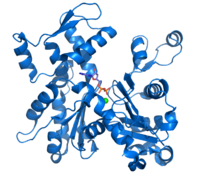
Photo from wikipedia
The organization of actin filaments into a wide range of subcellular structures is a defining feature of cell shape and dynamics, important for tissue development and homeostasis. Nervous system function… Click to show full abstract
The organization of actin filaments into a wide range of subcellular structures is a defining feature of cell shape and dynamics, important for tissue development and homeostasis. Nervous system function requires morphological and functional plasticity of neurons and glial cells, which is largely determined by the dynamic reorganization of the actin cytoskeleton in response to intrinsic and extracellular signals. Oligodendrocytes are specialized glia that extend multiple actin-based protrusions to form the multilayered myelin membrane that spirally wraps around axons, increasing conduction speed and promoting long-term axonal integrity. Myelination is a remarkable biological paradigm in development, and maintenance of myelin is essential for a healthy adult nervous system. In this review, we discuss how structure and dynamics of the actin cytoskeleton is a defining feature of myelinating oligodendrocytes’ biology and function. We also review “old and new” concepts to reflect on the potential role of the cytoskeleton in balancing life and death of myelin membranes and oligodendrocytes in the aging central nervous system.
Journal Title: Cellular and Molecular Life Sciences
Year Published: 2018
Link to full text (if available)
Share on Social Media: Sign Up to like & get
recommendations!